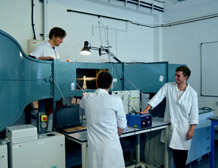Articles

Engineering students test the stability of a 3D printed pylon in the fluid dynamics lab.
Conversion courses to provide new opportunities for non-engineering graduates
Following the award of government funding from the Higher Education Funding Council (HEFCE), the University of Exeter is promoting Masters courses for graduates from non-engineering backgrounds to transition into engineering.
It is anticipated that these programmes will provide a popular route for students from science and non-science backgrounds to take advantage of the national demand for graduates with an engineering qualification.
The programmes draw on Exeter’s expertise in Civil, Structural and Water engineering, which includes the world-leading Centre for Water Systems and Vibration Engineering Section. All of the conversion courses are available as a “with Management” variant, delivered in conjunction with the university’s Business School.
Intended to address the economy’s growing need for graduates in engineering, the HEFCE funds are being used to promote the conversion courses to non-engineers, and also to develop additional supporting mathematics modules to ease the transition from other subjects.
Upon completion of a Masters programme, students will be able to progress to full Chartered Engineer Status whilst retaining their undergraduate specialism.
Professor Stephen Eichhorn, Professor of Materials Science and Head of Engineering, said: “Engineering at the University of Exeter is ranked highly in the three major UK University league tables and our education is driven by world-leading research. We are delighted that this funding will allow us to develop additional support for conversion students, to assist their transition from other disciplines and open up their career opportunities for them whilst helping to address the growing demand for engineers”.
The innovative conversion programmes are delivered in short, intensive teaching blocks, enabling students to quickly build their knowledge of individual areas. This model also facilitates study for existing professionals wishing to undertake CPD without taking long periods of time off work.
HEFCE research identified a growing demand for graduates in engineering professions, with a specific demand from employers for graduates with professional skills such as communication, project management and strategic thinking. Graduates from non-engineering backgrounds are likely to be equipped with a broader range of skills and thus make well-rounded candidates when entering the jobs market, something that is highly valued by prospective employers.
Professor Dragan Savic, co-director of the Centre for Water Systems, who teaches on the MSc Water Engineering, added: “Employers throughout the economy are placing more and more value on individuals with well-rounded skill sets and characteristics that have been developed through their undergraduate study. By choosing to expand on their learning and existing skills with an engineering conversion at Exeter, graduates are giving themselves a real edge in an increasingly competitive job market, where demand for engineers continues to rise.”
David Forber, a current University of Exeter postgraduate engineering student who took his first degree in Geology, said: “Coming to study Engineering at Exeter felt like a progression rather than a transition. In my first degree I developed skills such as reporting, analytics, field work and perseverance. Which have all proven to be really useful in my current study.”
Date: 9 May 2016
